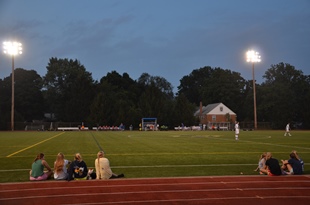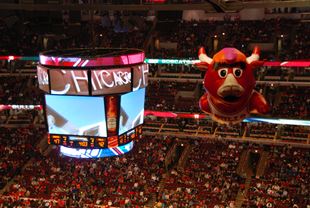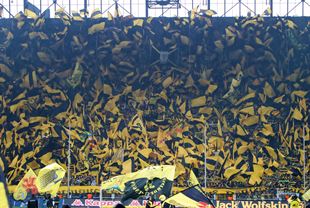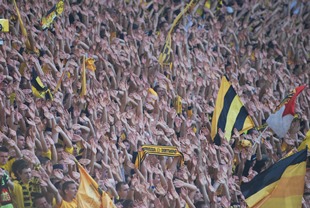
Why? No really! Why?
 America’s infatuation with the sport of “round football” is at a dizzying level right now. The World Cup has opened the general American’s eyes that there is more to the world of football than England or the MLS. I receive more comments about my Borussia Dortmund jerseys, shirts, and miscellany now more than any time in the past 4 years. The knowledge is not deep club knowledge, usually ending up with questions like “Why’d you sell Lewandowski?” or “How’d you let Götze go?” But beyond that, I also get questions like “how do you follow the Bundesliga if you don’t speak German?” and I get the most frequent inquiry now more than ever: “Why Dortmund?”
America’s infatuation with the sport of “round football” is at a dizzying level right now. The World Cup has opened the general American’s eyes that there is more to the world of football than England or the MLS. I receive more comments about my Borussia Dortmund jerseys, shirts, and miscellany now more than any time in the past 4 years. The knowledge is not deep club knowledge, usually ending up with questions like “Why’d you sell Lewandowski?” or “How’d you let Götze go?” But beyond that, I also get questions like “how do you follow the Bundesliga if you don’t speak German?” and I get the most frequent inquiry now more than ever: “Why Dortmund?”
Germany, and by default, the Bundesliga, is a confusing place for Americans. Outside of Oktoberfest, foreign exchange students, war/military connections and cultural touchstone David Hasselhoff, mainstream American culture does not understand most of German culture. Add to that “soccer” is still the 5th most popular sport in terms of league revenue and annual TV ratings. Thus, I am here to explain, rationalize, and provide logic to the proverbial question beyond just the previous explanation of “it is what it is.” So really…why?
 Given: I was vulnerable. I played football (and was quite good) as a kid. However, beyond the youth level of under-12 leagues, the systems in America were non-existent and I moved over to basketball. At the risk of sounding like a washed up former talent barking “I could’ve been a contender…I could’ve been somebody, instead of a bum”, American soccer was not prominent or easy when I was young. Our greatest accomplishment was hosting the World Cup and our hideous faux denim jerseys. The victory over Columbia in 1994 is a bigger deal now than it was back then because no one (myself included) truly grasped just how insane that was. I always followed the sport (never aggressively) and had an interest in the games (whenever I could get them), but I just never had a reason to care for any one club team.
Given: I was vulnerable. I played football (and was quite good) as a kid. However, beyond the youth level of under-12 leagues, the systems in America were non-existent and I moved over to basketball. At the risk of sounding like a washed up former talent barking “I could’ve been a contender…I could’ve been somebody, instead of a bum”, American soccer was not prominent or easy when I was young. Our greatest accomplishment was hosting the World Cup and our hideous faux denim jerseys. The victory over Columbia in 1994 is a bigger deal now than it was back then because no one (myself included) truly grasped just how insane that was. I always followed the sport (never aggressively) and had an interest in the games (whenever I could get them), but I just never had a reason to care for any one club team.
Given: American professional sports is a disenchanting, sad world. When I was a kid, the local hockey team moved from Minnesota (arguably the hockey capital of America), to TEXAS. There is no snow in Texas. There is no outdoor hockey in Texas. It makes NO SENSE. I’ve watched billionaires ruin local teams with apathy and force local governments into paying for their stadiums and arenas as the teams keep all of the profits generated by the stadium. You’re beholden to believe in someone running a team of grown mercenaries who truly just does not give a shit about you or your interest in their team as long as you’re PAYING and BUYING.
 The “Where”- My life put me in the Ruhr area a lot. I visited the Ruhr/Rhine region staggeringly often for someone who isn’t from the area. Even my ancestors aren’t from the area. My first experience in Europe was not gallivanting around like a shithead college kid drinking on my parents’ dime. I toured in a band. My first European visit EVER was the tourist hub in scenic Essen. I spent time in Dusseldorf, Bochum and Dortmund playing shows, staying in crappy hotels, and just driving through. When my job started to have me spend weeks on end in Dortmund and meeting people and spending rainy Tuesday nights or Saturdays in the area, it was inevitable.
The “Where”- My life put me in the Ruhr area a lot. I visited the Ruhr/Rhine region staggeringly often for someone who isn’t from the area. Even my ancestors aren’t from the area. My first experience in Europe was not gallivanting around like a shithead college kid drinking on my parents’ dime. I toured in a band. My first European visit EVER was the tourist hub in scenic Essen. I spent time in Dusseldorf, Bochum and Dortmund playing shows, staying in crappy hotels, and just driving through. When my job started to have me spend weeks on end in Dortmund and meeting people and spending rainy Tuesday nights or Saturdays in the area, it was inevitable.
The “Who” - The ownership structure in Germany is exemplary. Germany is fighting the overwhelming urge of domestic and foreign billionaire playboys and corporations investing into teams as marketing engines, and as an American, I hate that influence on sports and I absolutely love that there is a core base in the country resisting this. We can watch anyone kick a ball on a field.
 The German teams might have varying levels of corporate underwriting and might have stocks floated on the open market, but this is a sport where billions are needed to operate successfully. The simple fact for me is that the 50+1 rule is a riveting example of what’s right with the league. Every American I tell about the 50+1 (I’m a pseudo-evangelist of the Bundesliga way at this point), finds this right, correct, and good. No one enjoys the vapid individuals in America like Frank McCourt, Donald Sterling, or Jerry Jones (Google them) beyond the tabloid drama that follows them. Conversely, Gazprom is a major sponsor of Schalke. We all know what “Rasenballsport Leipzig” is doing, and Hoffenheim is a sporting boomtown from nothing barely qualifying as a club. Regardless of those fringe cases, there is still a rule that limits and prevents someone like Vincent Tan, Roman Abramovich or the Glazers from coming in, overhauling an entire history and treating a core aspect of a city and a culture like a set of Panini cards or a disposable video game. I didn’t grow up in Germany, but the RasenBullShit Leipzig situation offends me because it goes against the very reason I find the German model so appealing. This is the closest thing to democratic control of billionaire business moves and the fact it can still be defended is a good thing.
The German teams might have varying levels of corporate underwriting and might have stocks floated on the open market, but this is a sport where billions are needed to operate successfully. The simple fact for me is that the 50+1 rule is a riveting example of what’s right with the league. Every American I tell about the 50+1 (I’m a pseudo-evangelist of the Bundesliga way at this point), finds this right, correct, and good. No one enjoys the vapid individuals in America like Frank McCourt, Donald Sterling, or Jerry Jones (Google them) beyond the tabloid drama that follows them. Conversely, Gazprom is a major sponsor of Schalke. We all know what “Rasenballsport Leipzig” is doing, and Hoffenheim is a sporting boomtown from nothing barely qualifying as a club. Regardless of those fringe cases, there is still a rule that limits and prevents someone like Vincent Tan, Roman Abramovich or the Glazers from coming in, overhauling an entire history and treating a core aspect of a city and a culture like a set of Panini cards or a disposable video game. I didn’t grow up in Germany, but the RasenBullShit Leipzig situation offends me because it goes against the very reason I find the German model so appealing. This is the closest thing to democratic control of billionaire business moves and the fact it can still be defended is a good thing.
The intangible and actual effect of club membership and the limits to how much of a team can be owned by whom multiplied my interest. People can accurately say “our team.” Professional sports as a source of individual (and, by extension, civic) pride is a distant and abstract concept, but in Germany, you can truly describe the team as “we” and “our” and use those first person plural pronouns and not sound like a loser. Of course, there are marketing offices and people focused on doing their best to get me to spend as much money as possible (more on that in a future column), but I know that those expenditures are valued more than they ever could be in America. I can do all this knowing that a foreign oil magnate cannot buy my favorite team and have their colors changed to bright green for good luck.
 The “What” - German sports are not common in America. You have to dig for it. It takes work. English and Spanish media are easily accessible and translated in America. German just is not. Without the internet, none of this would be remotely possible, but that’s the world we live in. The experience is closest to when I was a kid and discovered underground music. I had to mailorder records and dig and find music. I was lucky because the best independent record store in America (volunteer, non-profit run, of course) was 10 miles from my house growing up. When you discover something intrinsically important that is not prevalent around you, it feels special and unique. Not in that hipster “I’m cool, I like something you don’t and want to keep it this way” unique. It is special in that you want to tell all of your friends. I found something that will blow your mind. I found something unlike anything you will ever see in your daily lives. Come check this out. Even with the growth of the sport in America, specifically related to BVB and most of the Bundesliga (even Bayern) you still have to work for it. It’s hard to explain to someone from Germany who is surrounded by the sport and has the history of the German leagues, the battle with amateur athlete statuses, the rise and fall of one-prominent clubs, and the folk tales of humans as heroes as a part of their psyche. As an American, the history just draws me in and with the Green Bay Packers of the NFL and their civic ownership model or the battle of the billion dollar NCAA and their “amateur status” of college athletes, it stays relevant and current.
The “What” - German sports are not common in America. You have to dig for it. It takes work. English and Spanish media are easily accessible and translated in America. German just is not. Without the internet, none of this would be remotely possible, but that’s the world we live in. The experience is closest to when I was a kid and discovered underground music. I had to mailorder records and dig and find music. I was lucky because the best independent record store in America (volunteer, non-profit run, of course) was 10 miles from my house growing up. When you discover something intrinsically important that is not prevalent around you, it feels special and unique. Not in that hipster “I’m cool, I like something you don’t and want to keep it this way” unique. It is special in that you want to tell all of your friends. I found something that will blow your mind. I found something unlike anything you will ever see in your daily lives. Come check this out. Even with the growth of the sport in America, specifically related to BVB and most of the Bundesliga (even Bayern) you still have to work for it. It’s hard to explain to someone from Germany who is surrounded by the sport and has the history of the German leagues, the battle with amateur athlete statuses, the rise and fall of one-prominent clubs, and the folk tales of humans as heroes as a part of their psyche. As an American, the history just draws me in and with the Green Bay Packers of the NFL and their civic ownership model or the battle of the billion dollar NCAA and their “amateur status” of college athletes, it stays relevant and current.
 The “Why & How” – The more time I spent in Dortmund, I began to warm up to the city in general. It became familiar. As I learned the language a little bit, it became easier to navigate for me. As I met more and more people in Dortmund and through the BVB connections, they realized that this wasn’t cultural curiosity, football tourism, or some lonely business traveler’s novelty a la Stockholm Syndrome. There was initially confusion. How, or more accurately, WHY does an American love Dortmund so much? When they (and some of you reading this) found out I really was waking up at 6:30AM every Saturday to catch every match, making breakfast for my kids at halftime and planning my life around every match, I was accepted and treated as one of the locals. Granted, I was a local that can’t speak German worth a damn, but that makes me no different than a few of the players, so that’s fine. My enthusiasm was reciprocated with genuine hospitality and a welcoming spirit that I didn’t deserve, but I truly appreciate. I’ve gone to matches and sat away from the madness and I’ve stood, sang, and screamed in a beer-shower in the Tribune, and I’d go and stand in the farthest corner of the stadium and be just as happy to have the chance to have a beer with the match instead of coffee. My bizarre fanaticism was welcomed with open arms, and it’s good to know I’m not alone 9,000 miles away.
The “Why & How” – The more time I spent in Dortmund, I began to warm up to the city in general. It became familiar. As I learned the language a little bit, it became easier to navigate for me. As I met more and more people in Dortmund and through the BVB connections, they realized that this wasn’t cultural curiosity, football tourism, or some lonely business traveler’s novelty a la Stockholm Syndrome. There was initially confusion. How, or more accurately, WHY does an American love Dortmund so much? When they (and some of you reading this) found out I really was waking up at 6:30AM every Saturday to catch every match, making breakfast for my kids at halftime and planning my life around every match, I was accepted and treated as one of the locals. Granted, I was a local that can’t speak German worth a damn, but that makes me no different than a few of the players, so that’s fine. My enthusiasm was reciprocated with genuine hospitality and a welcoming spirit that I didn’t deserve, but I truly appreciate. I’ve gone to matches and sat away from the madness and I’ve stood, sang, and screamed in a beer-shower in the Tribune, and I’d go and stand in the farthest corner of the stadium and be just as happy to have the chance to have a beer with the match instead of coffee. My bizarre fanaticism was welcomed with open arms, and it’s good to know I’m not alone 9,000 miles away.
The “When” – My consistent trips started in 2010 but really picked up in 2011. I could have possibly gone to Hamburg, Stuttgart, Bochum, Munich, or any other city with any other team, but my life put me in Dortmund. My work put me there as this special mix of players and a unique playing style started to crest. The 2010-2011 season was a bit of a surprise to the few people I knew and I didn’t quite “get it” in the same way as I do now. This team I knew only a little about and one of which I had no real personal understanding had won the championship…it seemed a bit too easy. But when you add all of those other factors to it, the force was magnetic. And now, five years later, I’m excited for April when I can bring my daughters and my wife to their first match so they can see what dad is always talking about.
And that, my friends, is the SHORT version of why I’m here. As it was once said, “knowing is half the battle.” Thanks for reading.
Karl, 09.10.2014
Weitere Artikel



